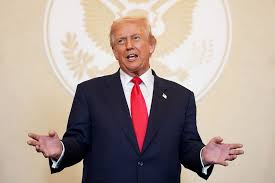
Trump’s Nuclear Test Plans Confound Experts
President Trump’s recent vow to resume nuclear testing has stirred a whirlwind of confusion among lawmakers, experts, and analysts alike. His announcement came shortly after a meeting with Chinese leader Xi Jinping, leaving many to speculate about his intentions. With the U.S. having observed a moratorium on nuclear tests since 1992, the implications of breaking this silence could be profound.
One prevailing theory suggests that Trump may be seeking leverage in negotiations with Russia and China. Recent developments, like Russia's boasting about successful nuclear weapon tests, have heightened tensions around global nuclear policies. Trump's statement, made via social media, lacked specifics, leaving many wondering whether he was referring to missile flight tests or actual nuclear detonations.
Former U.S. officials have raised concerns about the potential fallout from resuming nuclear tests. They argue that the U.S. could lose more than it gains, especially given that countries like Russia and China might respond by ramping up their own testing programs. The last nuclear test by the U.S. was in 1992, and both Russia and China have joined in a moratorium on nuclear blasts. However, there are suspicions that Russia has conducted low-yield nuclear experiments, which could push the U.S. to follow suit.
Moreover, the potential decision to resume nuclear testing could have a domino effect on other nuclear-capable states like India and Pakistan, further destabilizing an already fragile global nonproliferation architecture. Experts warn that breaking the testing moratorium would likely incentivize these nations to expand their own nuclear activities.
In addition to security concerns, the logistics of resuming tests present significant challenges. Preparing for a major nuclear test could take up to two years, while supercritical experiments might still require months of preparation. Given these complexities, the administration's intentions remain unclear.
Ultimately, the situation underscores the delicate balance of international relations regarding nuclear weapons. As countries navigate this intricate landscape, it is essential for India and other nations to monitor these developments closely, as they could have far-reaching consequences for global security.











